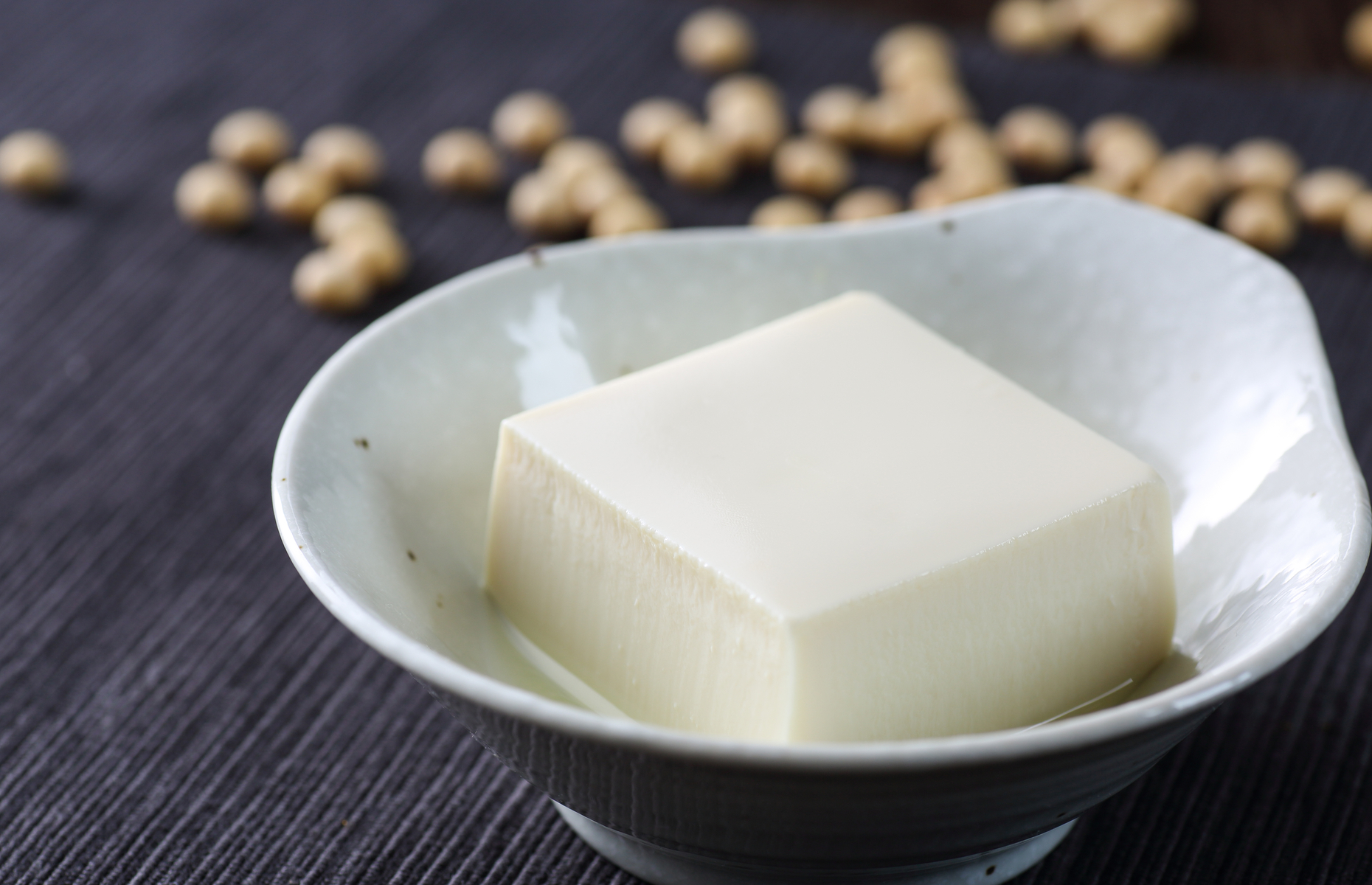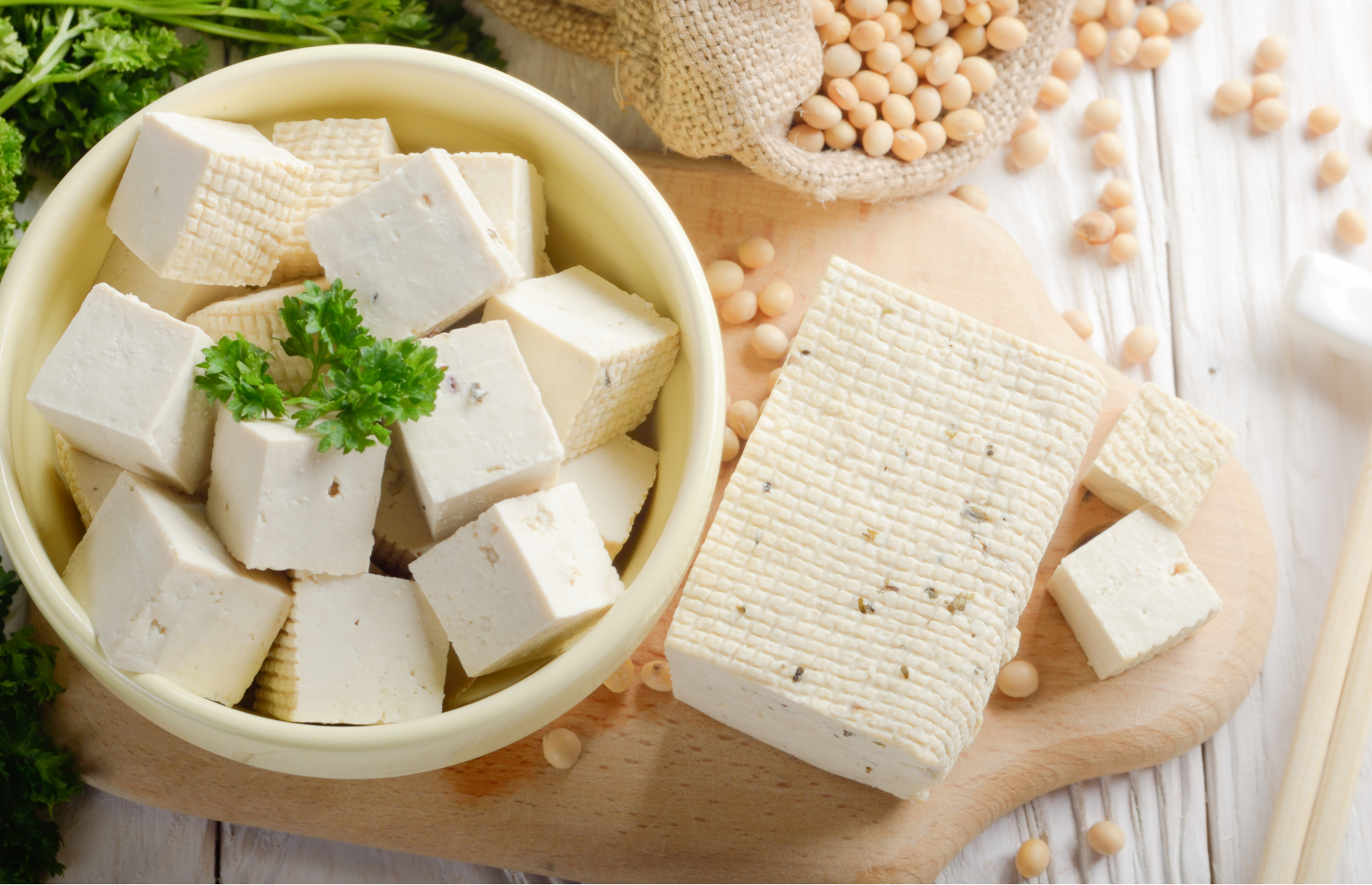Whether warm and soup-soaked, stir-fried with meat or coated in crispy batter, tofu is an incredibly versatile ingredient. Now the soy bean curd is widely available in supermarkets, it’s easier than ever to cook with it yourself. Here’s our guide to what tofu is, plus top recipe ideas.
Sections
What is tofu?
Tofu is made from soya milk – first, soya beans are soaked and crushed, then their ‘milk’ is separated into curds, pressed and cut (a bit like making cheese). Like cheese, some tofu is pasteurised and some is flavoured before being sold.
Free from dairy, eggs or nuts, it’s suitable for most people to eat, making it a common go-to in vegetarian and vegan dishes, as well as a great ingredient in its own right. Tofu is very mild but absorbs flavour well and is versatile, so it’s great for dishes like strong curries and stir-fries that are already well-seasoned.
It’s available in different textures – common varieties are silken (or soft) and firm. Atsuko Ikeda, who runs tofu cookery classes in London, explains the difference: “Both are made of the same ingredients – soy beans, water and nigari, a mineral coagulant such as calcium or magnesium salt. The difference between the kinds is the water content: soft tofu contains 90% of water which makes its texture almost custardy and ideal for salads and desserts.”

“Firm tofu has been pressed and its water content reduced. Its texture goes from crumbly to almost spongy, depending on its firmness. It works perfectly as meat or fish substitute and can be used in stir-fries, stews or lots of different kinds of fried food.”
READ MORE: A complete guide to miso
A lot of tofu on sale in the UK is firm and sold by the block in water, or chopped and ready to eat. You can also find soft or silken tofu (often in cartons) which is better suited to sauces and desserts. Check out the section on cooking with tofu for advice on which type of tofu is best suited to what dishes.

Where does tofu come from?
Tofu is an ancient Chinese food that was also adopted in Japan and other South East Asian countries. It was introduced to the UK and started to become a more mainstream ingredient in the 1970s when it was introduced by Chinese chefs and popularised by US cookbooks such as The Book of Tofu (1975). In the last 40 years the UK has seen a few producers setting up their own tofu factories, like Cauldron (1982), Clearspring (1993) and Clean Bean (1997).
What are the health benefits of tofu?
Tofu is great healthy choice – it’s low in fat and high in protein. It’s got about as much fat as chicken breast – 100g (3.5oz) of tofu contains about 5g (0.2oz) of fat. Comparatively, 100g (3.5oz) of skinless chicken breast contains about 4g (0.1oz).
It’s also a good source of protein, especially if you don’t eat meat or fish. Eggs contain about 13g (0.5oz) of protein per 100g (3.5oz), and tofu contains about 8g (0.3oz) – about the same as hummus or two tablespoons of peanut butter.
READ MORE: A complete guide to kombucha
It’s not bad for calcium, either, containing around 200mg (0.007oz) per 120g (4.2oz) serving – about the same as 30g (1oz) cheddar.
How to cook tofu
How to cook firm tofu
Firm tofu works really well when it’s fried, grilled or roasted. The important thing it to make sure you’ve drained and pressed it beforehand – this gets the water out and helps the oil, sauce or marinade in. You don’t need any fancy equipment, just paper kitchen towel and, if you’ve got a big of time, a heavy chopping board on top will help press it a little more.
To fry tofu, slice or cube it then add it to a pan with hot oil. Bonnie Chung, who has a tofu cookbook coming out in 2021, has a top tip if you want a crisp crust: “Tofu loves cornflour. It makes much crispier tofu than wheat and potato flour as a coating, and only requires a thin layer of cornflour before shallow-frying.”
To roast tofu, tear, slice or cube it, toss it in oil, and pop it in a medium-hot oven for half an hour until golden-brown.
Whether you’re frying or roasting, you can add a sauce or glaze afterwards, or marinade the tofu first.
Find more tips for cooking firm tofu here
How to cook silken tofu
In soups and curries, you can use firm or silken tofu – just be careful to stir it carefully to stop it breaking apart. If you’re cooking with silken tofu for the first time, Bonnie recommends an easy breakfast dish: “Silken tofu is great for a vegan scramble. Add turmeric and diced red onion and stir-fry it in olive oil. Season with salt, pepper and some chilli flakes before serving.” You could also try this recipe for a vegan breakfast burrito which combines scrambled tofu and plantain.
You can also serve tofu without cooking it – for instance, cubing it then marinating it for ten minutes before topping a rice bowl or a salad.
Top tofu recipes
Enjoy your takeaway favourites at home with recipes for chilli salt tofu, panang or massaman curry, sweet and sour tofu and tofu shashlik. These gyoza with tofu and mushrooms also make a great starter or side.
READ MORE: Everything you wanted to know about jackfruit
For a lighter dinner, this Korean seafood silken tofu soup uses soft pieces of tofu with prawns, mussels, clams and scallops in a spiky gochujang broth.
Try out tofu for dessert with Atsuko Ikeda’s cute individual yuzu ‘cheesecakes’. Tofu keeps it creamy but lowers the fat content a little, compared with recipes using nothing but dairy.
She adds: “Tofu is extremely versatile and can be used beyond your usual stir-fry. In my tofu class we have fun tweaking classic recipes using tofu to accommodate vegan or dairy-free diets. My tofu cheesecake recipe is a favourite, as is my tofu pannacotta which uses kuzu, a traditional Japanese plant-based starch thickener, which turns almond milk into sweet almond tofu.”
If you want to try a tofu cheesecake without the dairy, this raspberry recipe has vegan dinner parties covered.
Find a list of Atsuko's upcoming cooking classes, including her tofu classes, here.
Lead image: Oksana Mizina/Shutterstock